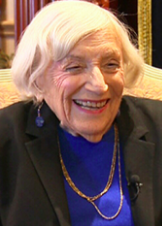By Hannah Berman ||Contributing Writer
Photo Courtesy of fandm.edu
This past week’s Common Hour held in the Alumni Sports and Fitness Center on September 5th held an audience of approximately 1,200 people who had all come to hear Marthe Cohn tell her story. Born in April of 1920 in Metz France, Cohn was one of seven children born into a Jewish family living near the German border when the Second World War broke out in 1939. She and her family fled to the south of France, and in 1944 after Paris was liberated from Nazi occupation, she became a member of the Intelligence Service of the French 1st Army when she was 24 years old. As she was fluent in German she was able to pose as a German nurse to acquire and deliver vital information to French intelligence forces through the Swiss border. She has written about these experiences in Behind Enemy Lines: The True Story of a French Jewish Spy in Nazi Germany. In 1945 she received France’s war cross for her service and bravery, in 1999 she was granted the French military medal, awarded the legion of honor in 2002. And most recently she was again honored for her service to France with the Medal of the recognition of the nation in 2006.
As president of Chabad at Franklin and Marshall, a Jewish organization on campus, I had the honor of introducing Ms. Cohn at Common Hour and having dinner with her and her husband, Major, that night with other students and members of the community. As the night progressed, one of the guests asked her if she faced any angry audiences at her lectures and to my fascination but understanding, she replied that some American audiences were hostile to the idea that there were French people who actually helped to save Jews during World War II. As a student of history, I know the importance of educating one’s self of the many sides and perspectives of a conflict. The way that most American students are taught about World War II is through the lens of American triumph over European fascism and cowardice. While there were French civilians and politicians who did in fact collaborate with the Nazis, there were also numerous French clergymen, civilians, and resistance fighters who not only sheltered Jews from the Nazis but also fought for the liberation of France from Nazi occupation. Europe, especially France, has an incredibly rich history of revolution and promoting the fight for classically Liberal principles codified by the Philosophe of the Enlightenment. These values survived the war through the resistance fighters and their story is often left out of the main narrative surrounding education about World War II in the United States. To help combat the ever-increasing tunnel vision that many people across the world, not just the United States, have regarding history can be found in another piece of advice from Marthe Cohn. She told a student during the question and answer portion of Common Hour that the answer to ignorance is to stay engaged and to not do anything that your conscience disagrees with. With engaging comes immersing oneself into a new perspective that can sometimes be uncomfortable, but that immersion is critical to educating and bettering yourself not just academically but as a member of society as well. Challenging yourself to think outside of your country’s perspective, or even your own personal biases will do so much to broaden your thinking and to extend your empathy and understanding on a basic human level. Marthe Cohn’s story embodies both extremes that human beings are capable of, extreme violence and hatred and extreme bravery and kindness. We are the last generation that will have the chance to meet and engage with living survivors of the Holocaust, and from them, we learn incredible lessons. From Marthe Cohn in particular, I learned that education and social engagement is the key to providing a better tomorrow to the generation that we leave this world to.
Contributing writer Hannah Berman is a Senior, her email is hberman@fandm.edu
